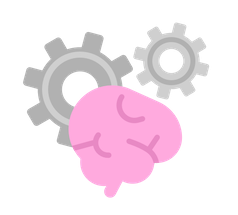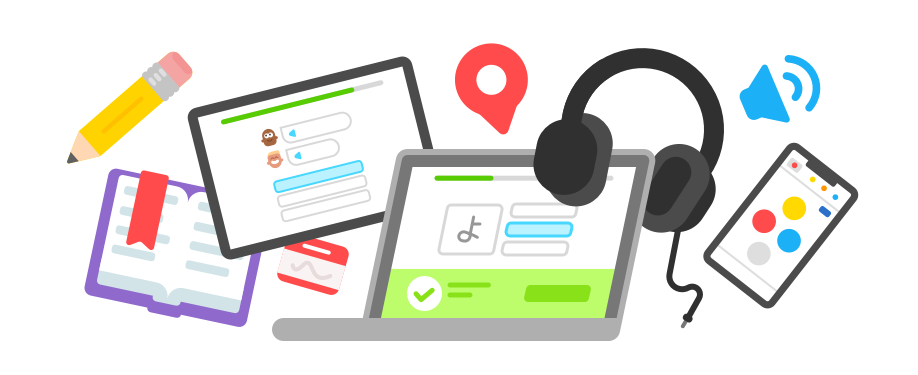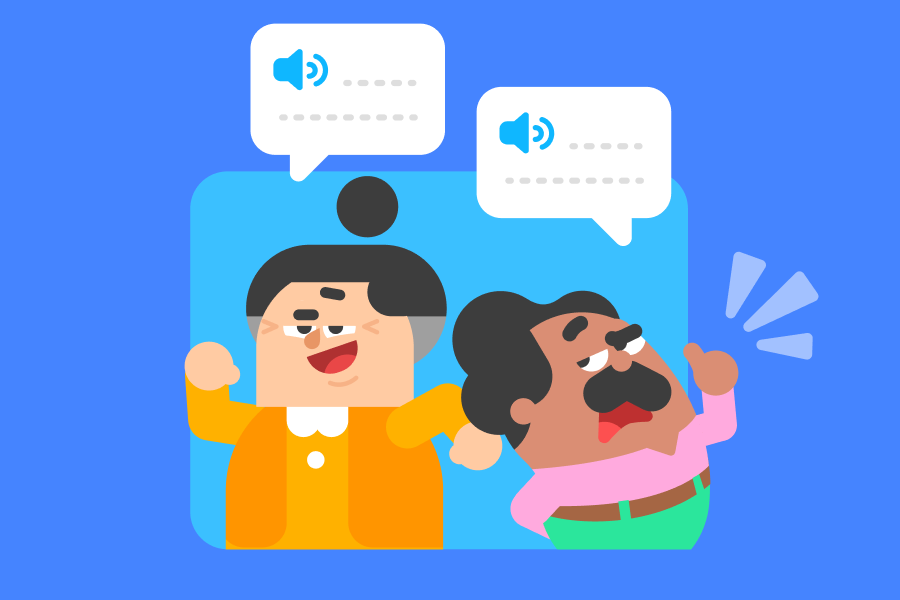Learning a new language is a complex task, but the benefits of language learning include social and cultural connections, as well as health and cognitive advantages. Research shows that it’s never too early or too late to start learning a new language—our brains are far more adaptive and flexible than previously thought, and our brains are built for language learning! Whether you are 8 or 80, learning French or Korean, studying a new language for the first time ever or for the first time in 50 years, there’s never been more reason and more support for learning a new language.

Connect to people and cultures
Language is all about communication and connection, and studying a new language brings people and cultures closer to us. At the beginning, learning a language might feel like all vocabulary and grammar, but it doesn’t take long to build up the skills to make meaningful connections in the new language. In fact, the Common European Framework of Reference for Languages (or CEFR) prioritizes personal, family, and descriptive language for beginners.
Learners today have more access to more languages—Duolingo has courses in 40 languages—and so the importance of personal and cultural reasons for language study is becoming clearer. A recent report shows that interest in culture drives learners to Korean, and this trend is likely linked to the rise of Korean entertainment and media, including K-pop and Korean dramas. The study also shows that family reasons are especially important for those choosing to study Chinese. Language is such a strong link to heritage that in some places we see the local language has become more popular on Duolingo than languages like Spanish and French: Hawaiian and Japanese are now the second and third most popular languages to study in Hawaii, and Irish has overtaken Spanish as the most popular language to study in Ireland.
Challenge your brain
Adults’ brains may not be quite as flexible as children’s, but they are still really adaptable and ready to learn! Most learners can reach their communication goals without striving for the vaguely-defined concept of “fluency,” and your adult brain is definitely equipped for that kind of language learning. Even after just a few months of language study, adult learners’ brains show changes and even some processing patterns like those of native speakers. And after a year of learning, adults show improvements in the kind of cognitive adaptations that make bilinguals successful in switching between their languages.

Being bilingual trains your brain to perform a cognitively complex task: turning one language “down” while turning the other “up,” in every interaction, for every word! Bilinguals’ brains treat languages like a seesaw, raising one up higher when it’s needed, and pushing lower the one not being used. This push-and-pull in their brains gets bilinguals practicing a specific kind of attention and control.
Bilinguals who codeswitch, or use both their languages in the same conversation, are getting another kind of cognitive workout by keeping their language seesaw balanced: they might move from all one language, to all another language, and then to really sophisticated systems of mixing that use both languages at once!
Support healthy aging
For older adults, language learning can serve as an engaging activity that promotes problem solving and strategizing, which research shows can improve cognitive functioning.
Languages provide new ways of interacting with people in our communities and around the world. While students may have the option of learning a new language in school, technology makes it easier than ever before for older adults to learn, too. Apps, virtual language meet-ups, and online forums give adults ways to engage directly with language practice partners and native speakers. Exploring new cultures, travel, and making new social connections with people around the world can also have a positive impact on older adults. For example, research shows that interacting more regularly with more people has benefits for older adults’ health and quality of life.
Bilingual adults who use their languages regularly may even show a delayed onset of dementia symptoms compared to monolinguals—bilingual brains are better able to resist the disease and function healthily for longer!
It’s never too early or too late to start learning!
From your brain’s perspective, people of any age can learn new languages—but it’s typically harder for adults to find the time and resources to get the learning to stick. Language learning takes time and patience, and it should also be enjoyable.

The best way to learn a language is whatever method motivates you to keep at it! Here are some ways to start your learning journey today:
- Use free tools and resources to try different things and discover what works for you.
- Find ways to practice a little bit at a time, every day. It’s better to study 5 minutes every day than an hour one day a week!
- Link your study time with other parts of your schedule to help you remember and fit in language practice. You could do lessons with your morning coffee, read a bit on your afternoon commute, or listen to music in the language while working out.
- Label household objects with stickers of the words in the new language. You can go room-by-room or focus on the objects that you interact with the most.
- Watch shows on your favorite streaming service with audio in the new language and captions in your own language. This will help train your ear, and it won’t even feel like studying!
- Find or create a playlist with songs in the language you’re studying. This is a great way to get used to common phrases, and the repetition in songs is great for learning. The language will really get into your head!
- Follow social media accounts that post in the language you’re learning, enabling you to see posts about your favorite topics in the language as you scroll.
- For languages you have some experience with, change your phone’s interface to the language. You’ll learn tons of useful vocabulary really quickly.
For more tips and learning ideas, check out the rest of the Duolingo Blog! You’ll find posts with activities for kids and the young at heart, ideas for staying motivated, and ways to improve specific skills, like speaking and reading!
